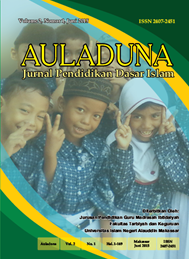PENDIDIKAN KARAKTER BANGSA: Pemahaman dan Implementasinya pada Orsosmas
Abstrak
Abstract: Education is meant to improve individuals' competence to regulate their emotions and to have the attitudes of being tolerant, opened, honest, integrity, accountable, treat people respectfully, responsible, care, skillful, creative, hardworking, full of courage, independent, confident, wise, diligent, tough, orderly, have law awareness, discipline, peaceful, polite, generous, and low profile. All of these are the characters that will be achieved through education. Since education is an effort to produce personality based on the values that supports the strengthening of nationalism.
Abstrak: Pendidikan dimaksudkan untuk meningkatkan kemampuan individu mengendalikan emosi dan bersikap toleran dan terbuka, jujur, loyalitas, dan integritas, dapat dipercaya, memperlakukkan orang lain dengan penuh hormat, bertanggung jawab, adil, serta peduli dan kasih, memiliki ciri manusia terampil, kreatif, kerja keras, bersemangat, mandiri, percaya diri, bijak, tekun, tegar, tertib, sadar hukum dan aturan, disiplin, damai, santun, suka menolong, dan baik serta rendah hati. Kesemua yang disebut yang ingin dituju oleh pendidikan karakter. Pendidikan karakter adalah upaya pembentukan keperibadian berdasar pada nilai-nilai yang dapat mendukung penguatan sikap kebangsaan dan nasionalisme.##plugins.generic.usageStats.downloads##
Referensi
Abuud, Abdul Ghani. Al-Fikru al-Tarbawiy 'Inda al-Ghazaliy, Cairo: Daar al-Fikri al-Arabiy, 1982.
Al-Bouthy, Said Ramadhan. Al-Islam wa Musykilaat al-Syabab, Maktabah Farisiy, 1393 H.
Al-Miskawaih, Abu Ali Ahmad. Tahdziibu al-akhlaaq wa Tathhiru al-a'raaq (Tahqiiq Ibnu al-khatiib), Lebanon: Dar al-Kutub al-'Ilmiyyah, 1398 H.
Arsyad, Azhar. al-Qiraah al-Ashriyyah, Pustaka Pelajar, Yogyakarta, 2002.
______. Retorika Kaum Bijak: Media Pembangkit Motivasi dan Daya Hidup Serta Penanaman Nilai-Nilai dan Budi Luhur, Makassar: Yayasan Fatiya, 2005.
Colman, Dictionary of Psychology, Oxford Presss University, 2003.
Goble, F and David Brooks. The Case for Character Education: The Role of the School in Teaching Values and Virtue, California: Studio 4, 1997.
Ikhwân al-Shafa’, al-Rasâil, vol. 1, Beirut, 1957.
Lanqing, Li. Education for 1.3 Billion, Research Press, 2004.
Nasr, Seyyed Hossein. Traditional Islam in the Modern World, Kegan Paul International, London: 1994.
Qutb, Muhammad. Minhaju al-Tarbiyyah al-Islamiyyah. Cairo: Dar al-Syuruuq, tt.
Republika, Harian Nasional. "Berhenti bersikap Egoistis" oleh Dwijuwono (tanggal 12 Juni 1996).
Bohlin, Karen D. Farmer, Kevin Ryan. Building Character in Schools: Resource Guide, California: Jossey Bass, 2001.
Raines, John C. dalam Azhar dkk, Islam dan Perdamaian Global, cet. I: IAIN Alauddin Makassar, 2002.
Shihab, Quraish. Wawasan al-Qur'an, Bandung: Mizan, 1998.
______. Secercah Cahaya Ilahi, Bandung: Mizan, 2000.
Mahmûd, Muhammad Thâha, Durǔsun fi al-Akhlâq, Cairo: Mathba'ah al-Ma'ahid, 1932.
Yunus, Mahmud. Attarbiyatu wa al-Ta'liim, Jilid 1, Padang Panjang: Al-Maktabah al-Sa'diyah, 1942.
Authors who publish with AULADUNA: Jurnal Pendidikan Dasar Islam agree to the following terms: Authors retain the copyright and grant Universitas Islam Negeri Alauddin Makassar right of first publication with the work simultaneously licensed under a Creative Commons Attribution License (CC BY-SA 4.0) that allows others to share (copy and redistribute the material in any medium or format) and adapt (remix, transform, and build upon the material) the work for any purpose, even commercially with an acknowledgement of the work's authorship and initial publication in Universitas Islam Negeri Alauddin Makassar. Authors are able to enter into separate, additional contractual arrangements for the non-exclusive distribution of the journal's published version of the work (e.g., post it to an institutional repository or publish it in a book), with an acknowledgement of its initial publication in Universitas Islam Negeri Alauddin Makassar. Authors are permitted and encouraged to post their work online (e.g., in institutional repositories or on their website) prior to and during the submission process, as it can lead to productive exchanges, as well as earlier and greater citation of published work (See The Effect of Open Access).

This work is licensed under a Creative Commons Attribution-ShareAlike 4.0 International License.

